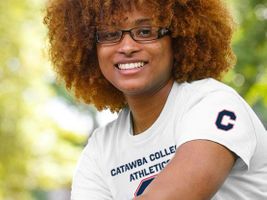Catawba students enrolled in the Honors class Outbreak!, taught by biology professor and assistant provost, Dr. Steve Coggin, have been studying infectious diseases this fall and even made a trip to the Centers for Disease Control and Prevention in Atlanta to learn more.
Although the diseases studied included cholera, plague, syphilis, measles, tuberculosis and leprosy, the class happened to coincide with the Ebola virus disease epidemic in West Africa and the appearance of the first Ebola cases in the United States.
Students in the Outbreak! class have discussed Ebola every day, have read a book about an earlier outbreak of Ebola in monkeys in the U.S., and saw disease control and prevention in action when they toured the David J. Sencer Museum at the CDC. Lessons learned at the CDC were about the eradication of small pox, the elimination of malaria from the US, the AIDS epidemic and Legionnaire's disease.
The students also have read extensively about the safety measures need to work with the most dangerous pathogens in Biosafety Level 4 labs. These measures include working in a biohazard suit that we have all seen pictured in news coverage of the African Ebola crisis.
The museum at the CDC had several of these suits (sometimes known as space suits) that the students were able to try on. They found these were difficult to get into. As soon as the suit was sealed, they immediately became hot inside and the inside of the helmet fogged up. This experience gave the students a brief taste of how difficult it is to work with dangerous microbes.
The students in the Outbreak! class have also done an experiment to demonstrate Koch's Postulates with a fungal disease of oranges. In this exercise, the students replicated the work of Robert Koch, one of the founders of modern microbiology, to prove an organism causes disease. The Outbreak! students have also run mathematical models of epidemics to examine the effect of population size, infection rate and recovery rate. Mathematical simulations, such as these, are essential for epidemiologists to understand a disease and perhaps stop an outbreak.
Students in the class include Emily Auwarter, Katelyn DeZego, McKenzie Garrison, Chelsea Hatfield, Alexis Kershaw, Christopher Koehler, Cayli Mena, Alison Michell, Alysia Plafcan, Alicia Richards, Sara Sellers, Taylor Spillman, Declan Stimson, Shelby Wellman and Amber Williamson.
